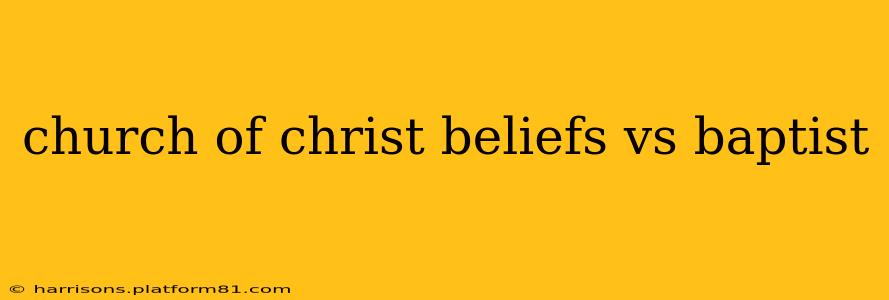Church of Christ Beliefs vs. Baptist Beliefs: Key Differences and Similarities
The Church of Christ and Baptist denominations, while both Protestant Christian traditions, hold distinct beliefs and practices. Understanding their differences requires examining core theological tenets, liturgical approaches, and ecclesiological structures. This comparison will illuminate the key distinctions and common ground between these two significant branches of Christianity.
What are the core beliefs of Churches of Christ?
Churches of Christ emphasize a restorationist approach, aiming to recapture the practices and beliefs of the early New Testament church. This leads to a strong emphasis on the authority of Scripture alone (Sola Scriptura), a cappella worship (no musical instruments), and congregational governance. They typically observe communion weekly and believe in the importance of immersion baptism as a prerequisite for church membership. They generally avoid denominational labels and hierarchical structures, preferring a more decentralized governance model.
What are the core beliefs of Baptists?
Baptist churches are diverse, encompassing a wide spectrum of theological viewpoints. However, certain common threads unite them. A core belief is the autonomy of the local church, meaning each congregation governs itself without external oversight. Baptist theology typically includes believer's baptism (adult baptism by immersion), the priesthood of all believers (emphasizing the equal spiritual standing of all members), and a high regard for the Bible as the ultimate source of authority. However, individual Baptist churches can differ significantly on issues like Calvinism vs. Arminianism, the role of women in ministry, and views on eschatology (end times).
What is the difference in church governance between Churches of Christ and Baptists?
Churches of Christ: Generally operate with a congregational polity, meaning decisions are made democratically by the entire membership. Elders (or overseers) serve as spiritual leaders and provide guidance, but their authority is derived from the congregation's consent. There's a strong emphasis on unity and consensus.
Baptists: Also typically have a congregational polity, with the local church holding ultimate authority. However, the structure and degree of congregational involvement in decision-making can vary significantly across different Baptist traditions. Some Baptist churches may have a more hierarchical structure with pastors holding significant authority, while others maintain a more egalitarian model.
Do Churches of Christ and Baptists have different views on salvation?
Both Churches of Christ and Baptists are generally soteriologically similar, believing salvation comes through faith in Jesus Christ. However, nuances exist:
-
Churches of Christ: Often emphasize the importance of obedience to God's commands as evidence of genuine faith. This doesn't imply salvation by works but rather sees obedience as a natural outworking of a transformed life.
-
Baptists: While also emphasizing faith in Christ, different Baptist traditions hold varying views on the role of good works in salvation. Some emphasize salvation as a purely grace-based event (Sola Gratia), while others acknowledge the importance of good works as a fruit of salvation.
How do Churches of Christ and Baptist churches differ in their worship styles?
Churches of Christ: Traditionally feature a cappella singing (no instruments), often using hymns and songs based on scripture. Their services generally involve preaching, prayer, communion, and Bible study. The emphasis is on simplicity and direct engagement with the Bible.
Baptists: Exhibit a much wider range of worship styles, depending on the specific church and its theological leaning. Some Baptists utilize traditional hymns and organ music, while others incorporate contemporary Christian music and more contemporary worship styles.
What are some common misconceptions about Churches of Christ and Baptists?
A common misconception is that all Churches of Christ and all Baptist churches are monolithic entities. The reality is that significant diversity exists within both traditions, leading to variations in practice and belief. It's crucial to avoid generalizations and approach each church as a unique entity.
Are there any similarities between Churches of Christ and Baptists?
Despite their differences, both Churches of Christ and Baptists share several key similarities:
- Belief in the Bible as the ultimate authority: Both denominations place significant emphasis on the Bible's authority in guiding their faith and practice.
- Importance of believer's baptism: Both traditions practice believer's baptism by immersion, though the theological emphasis may differ.
- Focus on evangelism and missions: Both denominations actively engage in missionary work and spreading the Christian message.
Understanding the nuances between Churches of Christ and Baptist beliefs requires moving beyond broad generalizations. By examining specific theological stances, ecclesiological structures, and liturgical practices, a clearer picture emerges of their unique characteristics and shared foundations. This detailed comparison should provide a more informed perspective on these two important branches of Protestant Christianity.
